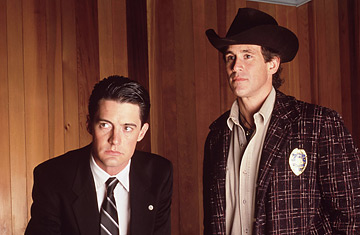
(l. to r.): Kyle MacLachlan and Michael Ontkean in Twin Peaks
Producers:
Mark Frost, David Lynch
With Kyle MacLachlan, Michael Ontkean
Paramount Home Video
Available Oct. 30, List Price $99.99
"There are many stories in Twin Peaks," says the Log Lady (Catherine Coulsen) in an introduction to the show's pilot. "Some of them are sad, some funny. Some are stories of madness, of violence. Some are ordinary. Yet they all have about them a sense of mystery: the mystery of life, sometimes the mystery of death. the mystery of the woods. ... It is a story of many, but it begins with one. ... The one leading to the many is Laura Palmer. Laura is the one."
Who killed Laura Palmer? In 1990, that was the biggest TV mystery since Who shot J.R.? a decade before, when Dallas was the top-rated show. Twin Peaks didn't make the top 30 in either of its two seasons, yet it had the right people watching: the young, the upper-middle-class and the media, which lavished attention on this weirded-out small-town soap opera and on Lynch, its co-creator. The week the show started its second season, he was on the cover of TIME. People bought Twin Peaks lunch boxes, and the highly regarded Access travel-book series issued a special guide to this imaginary town.
Cult TV shows are often prisoners of their time. What made them hot then makes them antiques today. But a look at Lynch's 2 hr. pilot and some of the 28 hourly episodes persuades me anew that Twin Peaks is timeless. Like the features films Lynch was making in the late '80s — Blue Velvet and Wild at Heart — the series is not of its time. It dwells in some alternate universe of the '50s, when Lynch was a kid in Missoula, Mont.; the dress, the music, the courteous tone of voice, the sense of propriety that he strips bare to reveal all manner of domestic diseases, all suggest a genial town with secret sins, as if the Father Knows Best clan had relocated from Springfield to Peyton Place.
This 10-disc box set collects the whole series, including the international version of the pilot that "solves" Laura's murder; you get everything but Lynch's 1992 feature-film prequel, Fire Walk With Me, which it would've been nice to include. As you settle into the town's relaxed pace and agitated undercurrent, and join FBI Special Agent Dale Cooper (the ultra-straight, slightly bent, very '50s-ish MacLachlan) at the local diner for a cherry pie and a cup of "damn fine" coffee, you'll realize that this ABC skein was just the kind of ambitious open-form programming that Showtime and especially HBO would take over a few years later. It's almost astonishing to think that the mass audience got to see this for free.
The final episode, which Lynch directed, has Cooper entering "another place": a red-cutained realm where he meets his demonic alter ego, where a mysterious midget introduces him to someone who may be Laura Palmer, and he collides with the man who murdered her — or did he? The episode is a real lease-breaker, one of the most extreme, artistically adventurous and confounding hours to be broadcast on one of the big-three networks. But it lays out Lynch's central artistic belief, of reality as a diluted form of the fantasy lives we all live.
That belief is nicely expressed in the Log Lady's introduction to the final episode: "There are clues everywhere, all around us. But the puzzlemaker is clever. The clues, although surrounding us, are somehow mistaken for something else. And the something else — the wrong interpretation of the clues — we call our world."